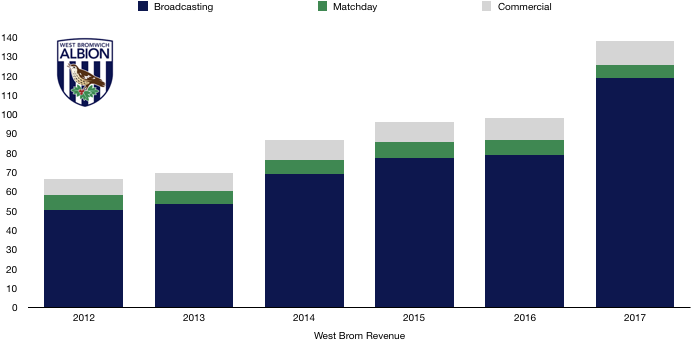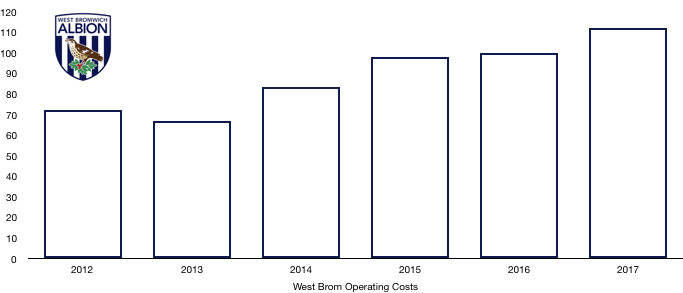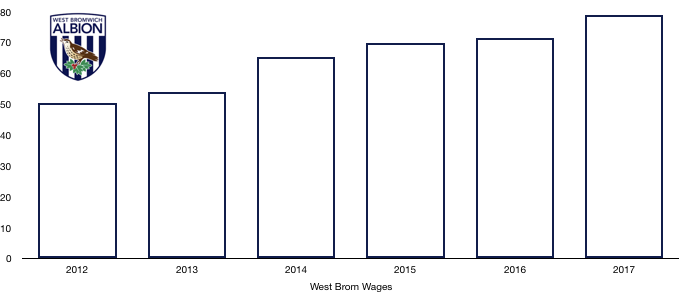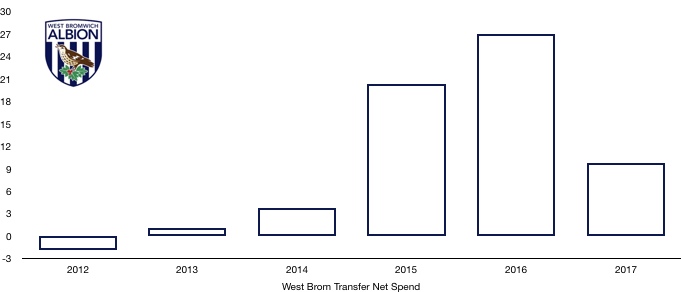West Brom secured their 8th consecutive season in the Premier League with a commendable top half finish, finishing in 10th place. Despite this success murmurs of fan discontent were apparent with the lack of evolution of West Brom’s playing style showcased by falling matchday revenue despite their improved results, this was compounded by poor performances in the domestic cups.
Profits did however shoot up, rising from a minimal £1.0m to a huge £32.3m after their success on the pitch in the Premier League.
Lets delve into the numbers.

Revenue Analysis

West Brom continued their year on year revenue growth with new record revenues as revenue rose from £98.3m to £137.9m (40.3%), breaking the £100m barrier for the first time.
All areas of revenue rose except for matchday revenue which fell from £7.7m to £6.8m (11.7%) as fan discontent around the club’s playing style led to more empty seats at the Hawthorns while the introduction of the away day ticket price cap compounded the issue.
Broadcasting revenue unsurprisingly rose, increasing from £78.9m to £118.7m (50.4%) with the new Premier League deal in effect while a improved 10th place finish boosted West Brom’s merit payments. Poor domestic cup performance meant that they relied almost exclusively on the Premier League for broadcasting revenue, while their better performances also led to more live TV games in the Premier League than usual, featuring 11 times last season.
Commercial revenue remained relatively stable with minimal new sponsorships. West Brom saw commercial revenue increase from £11.7m to £12.4m (6.0%), suggesting the club need to revamp their commercial strategy, although this may be too late due to their inevitable relegation. They have however pressed ahead revamping their director team with the exits of Richard Garlick and Nick Hammond.
West Brom have had an awful season which will inevitably at this point lead to relegation and as such West Brom will see a huge drop in revenue the year after next, this will slightly be offset by parachute payments. Matchday revenue is likely to continue falling with less fans turning out by the week while any relegation clauses in commercial deals may come into effect decreasing this as well. Broadcasting revenue will also fall due to a league position 10 places lower on the cards, offset slightly by improved domestic cup performance.
Expense Analysis

Expenses rose but only slightly relative to revenue leading to the huge boosts in profits, increasing from £100.1m to £112.2m (12.1%).
Amortisation costs did however rise significantly after player investment led to an increase from £13.2m to £18.1m (37.1%)
West Brom interestingly had no finance costs in the year while they had finance income of £0.2m.

West Brom saw wages increase a manageable amount, rising from £71.4m to £79.0m (12.1%), this represents only a modest increase in wages of an extra £165k a week after the club managed to get a couple high earners of the wage bill to make room for new signings, such prudence bodes well as the club prepare for their Championship season.
Directors took huge pay cuts despite their 10th place finish, with director pay falling from £3.4m to £1.3m (61.8%) as the cub began to shake up their management team. The highest paid director took a devastating pay cut, seeing wages fall to £262k from £1.9m!
West Brom had a sizeable tax bill of £7.5m, an effective tax rate of 18.8% which is effectively the UK tax rate with some minor adjustments leading to the slightly lower figure.
Expenses are likely to rise this year after player investment before a high drop the following year following relegation as wage drop clauses come into affect and amortisation costs drop.
Transfers Analysis

West Brom spent moderately last season with 4 players coming in and 5 leaving in what looked like a 1 in, 1 out policy for the Baggies.
In came Chadli (£13.7m), Livermore (£10.4m), Phillips (£5.9m) and Nyom (£4.2m) for a combined £34.1m.
Leaving the club were Berahino (£12.5m), Chester (£8.4m), Lambert (£1.8m), Gamboa (£1.1m) and Gardner on loan (£0.5m) for a total of £24.3m.
This left West Brom with a modest net spend of £9.8m, down significantly for the previous year’s net spend of £27.0m (63.7%) as the club scaled back the ambition of the club. Despite this tiny spend, the signings were successes as the club recorded a 10th placed finish after finally selling the troublesome Berahino. This success may have led to a false sense of comfort in their ability to compete on a budget, potentially a cause of their Premier League demise this season.
The club made a healthy profit on player sales, recording a profit of £13.9m, up from a measly £2.8m last year.
The club spent cash of £28.2m last season while only bringing in cash of £6.3m on players sales after giving clubs generous terms on when they need to pay for players brought last summer.
West Brom may also have to pay £5.7m based on contingent transfer fees. They also have the obligation to pay £3.2m for players brought this season and further £10.3m due after a year or longer.
Asset/Liability Analysis

West Brom are a conservative club showcased by their debt management, improving their finances to such an extent after a successful season that they moved from a net debt position to a net cash position in the year, deciding to consolidate their finances rather than kick on, a decision that looks short sighted with foresight.
Cash levels rose significantly, more than doubling from £14.3m to £39.5m (167%) after record profits and player sales leading to a huge cash boost which was not reinvested into the playing squad.
Debt levels remained fairly stable, adding debt of £1.2m to move the club from £22.5m to £23.7m (5.3%) in debt s the club new improved cash position meant no debt increase was really required to fund spending.
This meant West Brom moved from a net debt position of £8.2m to a net cash position of £15.8m, a huge swing in debt levels.
This approach obviously wasn’t appreciated by those at the top who have subsequently overawed the senior management team in a bid to learn from their mistakes that led to relegation.
Such a prudent approach may however suit them well in the Championship, however the owners will be thinking what could of been had they spent heavier in the first place.
Thanks for reading, share with a West Brom fan!

